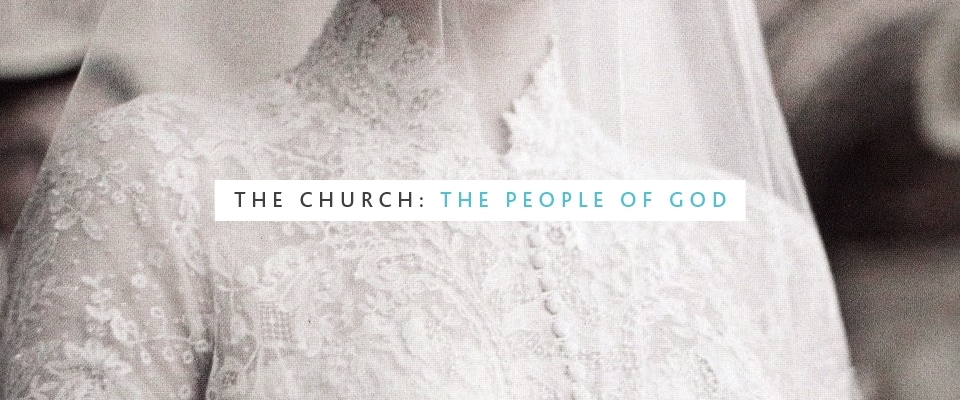In the previous post, What Is The Church?, Alastair concluded that the church can be defined by three metaphors in Scripture: the people of God, the body of Christ, and the temple of the Spirit. Over the next three posts we will flush out these descriptions of the Church. In this post, I will explore what it means for the church to be the people of God.
When I think of being “a people” (as in the Church being a people of God) I have to admit I struggle with the concept. I am going to blame it on our hyper-individualized Western culture. I do not often associate myself with “a people” or “my people.” I think we are taught to see ourselves as unique, special, different and to appreciate that as a good thing
Imagining myself as part of a people is a challenge. I can think of groups of people to which I might belong: American, but I am not gun crazy; Christian, but I am not a right wing nut job; Southern, but again I am not gun crazy, nor am I a redneck, nor am I a Belle; Counsellor, but not a quack. I find that it is easier to define who I am by defining who I am not. I would argue that most of us find this to be easier. Even as nations we define ourselves by who we are not (ah-hem, Canadians are not Americans, I get it).
So it is interesting to me that God calls his Church “a people”. Initially this was a title given to his nation, Israel (Exodus 6:7, and many other places). But even Israel struggled to identify what it meant to be a people of God without pointing the finger at who they were not. Not Egyptian. Not Canaanite. Not idolaters. Not Samaritans, not Gentiles, not breakers of the law, and definitely not those guys. I think you get the point.
It is helpful sometimes to begin with who we aren’t to help us identify who we are, but I would argue that creates an “in and out” exclusive pattern of thinking. This is not what God means when we say we are his people. His goal is always invitation and grace and stretching our small minded limits of inclusivity.
So, all this to say, what does it mean then to be the people of God as his Church.
First, I believe it is to remind us of our history. A people group always has a history. This story defines who we are. We are God’s people and that story is found in his word. We are a people of the book, his book, his narrative. We cannot be detached from it.
Sometimes being people of a story has its joys, like when a nation helps another nation and it becomes part of the identity of that nations people. Other times it has a humbling cost. An example in my life might simply be the fact that my ancestors were in America in the South for the Civil War and the Trail of Tears. I am not proud of that, but it is part of my people’s history. The story is filled with successes that define our strengths and failures that define our weaknesses.
We are part of God’s story. We are his people. We trace our lineage to Abraham, the Patriarchs, the 12 sons of Jacob, the slaves in Egypt, the wandering nation of Israel, the Kings, the Prophets, and ultimately in the story of Christ and his followers (cf. Galatians 3). Not all are glory filled moments but they are defining moments in our life as the people of God.
Second, to be a people means we also carry markers. In some cultures it is physical markers like skin colour, tattoos, or a familial trait. The markers of God’s people have more to do with our inner lives, marks the Cross has brought to bare on our hearts and souls. Israel had circumcision of all males, the Church has circumcision of the heart. Israel has a covenant of blood by sacrifice, the Church has the mark of the blood of the lamb. The people of God have the seal of the Holy Spirit. We don’t have one set national flag to wave or universal symbol to claim solely as our own. The markers are invisible to us but will one day be revealed. They define us and set us apart as God’s people, his Church.
Practical theologians (such as Alastair) may want me to point out the key external markers of the church: baptism and communion as our sacraments. But I am not trying to define what we do as the people of God. These are things we do, but they do not determine our becoming one of God’s people. Ultimately God is the judge of our heart, our faith, our trust in Christ as our Saviour. The Church’s one foundation is Jesus Christ our Lord, not what we do (1 Corinthians 3:11). What we do can be an essential expression of our faith in Christ, but it does not become our security. Christ is our security, our promise, our seal, our invitation to be God’s people. The marks that determine our place as a people of God are his not ours.
Third, to be a people means we are linked, united, held together by common values, beliefs, virtues, commitments and threads of loyalty and faithfulness. This is by far the simplest definition of “a people”. We are many persons united as one people (Galatians 3:28). Abstract as it may seem this is the reality of God’s church. Who is in and who is out is not really the concern here. The point is that God unifies his people, he brings them together spiritually as one, across time, space, physical, emotional, mental, racial and national boundary lines. He is at the centre of it all. He identifies his people. He calls them. He names them. He marks them. He disciplines them. He overcomes their differences. He teaches them. He shapes them. He sets them apart. He leads them. He protects them. He provides for them. He gathers them. He joins them. The church is His. His people.
Again, practical implications are not the goal of this post. My hope is that you can imagine and see the great gift God has bestowed upon us through his son. Through Christ we—the outsider, the foreigner, the gentile—are invited and welcomed into the protection, love, and care of God. We are made his people, a people caught up in his story, a people marked by his promise and faithfulness, a people united by him and in him. What an incredible blessing.
You are not on your own. You are his, and “His” means you are more than you can ever be on your own.




